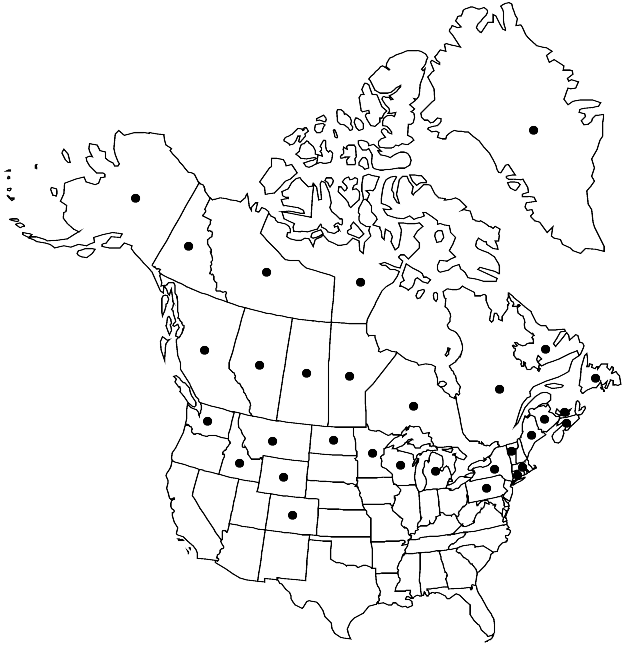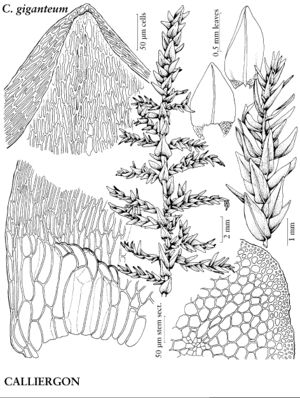Difference between revisions of "Calliergon giganteum"
Canad. Rec. Sci. 6: 72. 1894.
FNA>Volume Importer |
imported>Volume Importer |
||
| (6 intermediate revisions by 2 users not shown) | |||
| Line 9: | Line 9: | ||
|special_status={{Treatment/ID/Special_status | |special_status={{Treatment/ID/Special_status | ||
|code=F | |code=F | ||
| − | |label= | + | |label=Illustrated |
}} | }} | ||
| − | |basionyms={{Treatment/ID/ | + | |basionyms={{Treatment/ID/Basionym |
|name=Hypnum giganteum | |name=Hypnum giganteum | ||
|authority=Schimper | |authority=Schimper | ||
| + | |rank=species | ||
| + | |publication_title=Syn. Musc. Eur., | ||
| + | |publication_place=642. 1860 | ||
}} | }} | ||
|synonyms={{Treatment/ID/Synonym | |synonyms={{Treatment/ID/Synonym | ||
|name=Calliergon subsarmentosum | |name=Calliergon subsarmentosum | ||
|authority=Kindberg | |authority=Kindberg | ||
| − | }}{{Treatment/ID/Synonym | + | |rank=species |
| + | }} {{Treatment/ID/Synonym | ||
|name=H. cyclophyllotum | |name=H. cyclophyllotum | ||
|authority=Holzinger | |authority=Holzinger | ||
| + | |rank=species | ||
}} | }} | ||
|hierarchy=Calliergonaceae;Calliergon;Calliergon giganteum | |hierarchy=Calliergonaceae;Calliergon;Calliergon giganteum | ||
| Line 35: | Line 40: | ||
|elevation=low to high elevations | |elevation=low to high elevations | ||
|distribution=Greenland;Alta.;B.C.;Man.;N.B.;Nfld. and Labr.;N.W.T.;N.S.;Nunavut;Ont.;P.E.I.;Que.;Sask.;Yukon;Alaska;Colo.;Conn.;Idaho;Maine;Mass.;Mich.;Minn.;Mont.;N.Y.;N.Dak.;Pa.;Vt.;Wash.;Wis.;Wyo.;s South America;Eurasia;Pacific Islands (New Zealand). | |distribution=Greenland;Alta.;B.C.;Man.;N.B.;Nfld. and Labr.;N.W.T.;N.S.;Nunavut;Ont.;P.E.I.;Que.;Sask.;Yukon;Alaska;Colo.;Conn.;Idaho;Maine;Mass.;Mich.;Minn.;Mont.;N.Y.;N.Dak.;Pa.;Vt.;Wash.;Wis.;Wyo.;s South America;Eurasia;Pacific Islands (New Zealand). | ||
| − | |discussion=<p>Plants of Calliergon giganteum frequently resemble miniature spruce trees because of dense and successively longer branches from the shoot apex downwards, regular radial branching, and somewhat spreading branch leaves. The branch leaves are often markedly narrower and more ovate than the stem leaves and may resemble those of C. cordifolium in shape and costa width, but their alar regions are more sharply delimited. The stem leaves are usually broadly ovate-cordate with a broad costa and large and sharply delimited alar regions. Plants with a characteristic pink hue are most frequent in exposed habitats of the North. Differences between this species, 1. C. cordifolium, and 4. C. richardsonii are discussed under the latter two.</p> | + | |discussion=<p>Plants of <i>Calliergon giganteum</i> frequently resemble miniature spruce trees because of dense and successively longer branches from the shoot apex downwards, regular radial branching, and somewhat spreading branch leaves. The branch leaves are often markedly narrower and more ovate than the stem leaves and may resemble those of <i>C. cordifolium</i> in shape and costa width, but their alar regions are more sharply delimited. The stem leaves are usually broadly ovate-cordate with a broad costa and large and sharply delimited alar regions. Plants with a characteristic pink hue are most frequent in exposed habitats of the North. Differences between this species, 1. <i>C. cordifolium</i>, and 4. <i>C. richardsonii</i> are discussed under the latter two.</p> |
|tables= | |tables= | ||
|references= | |references= | ||
| Line 44: | Line 49: | ||
-->{{#Taxon: | -->{{#Taxon: | ||
name=Calliergon giganteum | name=Calliergon giganteum | ||
| − | |||
|authority=(Schimper) Kindberg | |authority=(Schimper) Kindberg | ||
|rank=species | |rank=species | ||
| Line 57: | Line 61: | ||
|publication title=Canad. Rec. Sci. | |publication title=Canad. Rec. Sci. | ||
|publication year=1894 | |publication year=1894 | ||
| − | |special status= | + | |special status=Illustrated |
| − | |source xml=https:// | + | |source xml=https://bitbucket.org/aafc-mbb/fna-data-curation/src/2e0870ddd59836b60bcf96646a41e87ea5a5943a/coarse_grained_fna_xml/V28/V28_615.xml |
|genus=Calliergon | |genus=Calliergon | ||
|species=Calliergon giganteum | |species=Calliergon giganteum | ||
Latest revision as of 21:36, 5 November 2020
Plants medium-sized to large, brownish, pale pink, or sometimes green or yellowish. Stems regularly radially branched; axillary hair apical cell elongate-rectangular to short-linear. Stem leaves broadly ovate-cordate; costa single, strong, (88–)95–282 µm wide near base, ending shortly before apex; alar regions sharply delimited, triangular, from margins to costa or nearly so; medial laminal cells 40–164 × 7–11(–12) µm. Sexual condition dioicous. Spores 15–21 µm.
Habitat: Wet, ± mineral-rich fens, ditches, shores, floating or submerged in lakes
Elevation: low to high elevations
Distribution

Greenland, Alta., B.C., Man., N.B., Nfld. and Labr., N.W.T., N.S., Nunavut, Ont., P.E.I., Que., Sask., Yukon, Alaska, Colo., Conn., Idaho, Maine, Mass., Mich., Minn., Mont., N.Y., N.Dak., Pa., Vt., Wash., Wis., Wyo., s South America, Eurasia, Pacific Islands (New Zealand).
Discussion
Plants of Calliergon giganteum frequently resemble miniature spruce trees because of dense and successively longer branches from the shoot apex downwards, regular radial branching, and somewhat spreading branch leaves. The branch leaves are often markedly narrower and more ovate than the stem leaves and may resemble those of C. cordifolium in shape and costa width, but their alar regions are more sharply delimited. The stem leaves are usually broadly ovate-cordate with a broad costa and large and sharply delimited alar regions. Plants with a characteristic pink hue are most frequent in exposed habitats of the North. Differences between this species, 1. C. cordifolium, and 4. C. richardsonii are discussed under the latter two.
Selected References
None.
